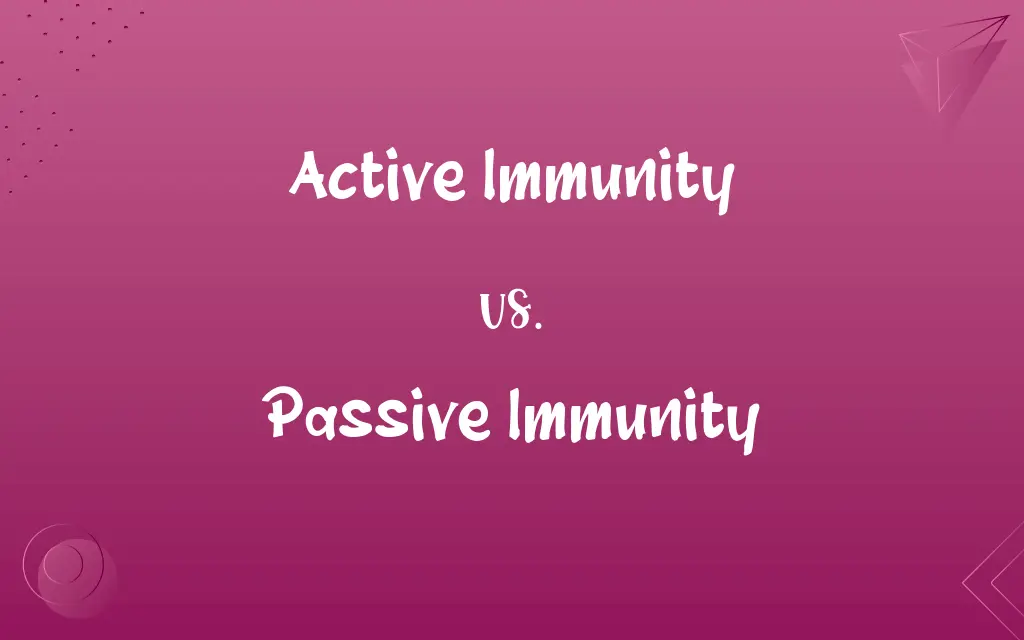Active Immunity vs. Passive Immunity: Know the Difference

By Shumaila Saeed || Updated on December 25, 2023
Active immunity is when the body generates its own antibodies, while passive immunity involves receiving antibodies from another source.

Key Differences
Active Immunity involves the body's own immune system actively producing antibodies in response to an antigen, like after a vaccination or infection. Passive Immunity, on the other hand, is where the body receives antibodies from another source, such as from mother to infant through breast milk or via an antibody-containing medication.
Shumaila Saeed
Dec 18, 2023
In Active Immunity, the immune response is typically long-lasting due to memory cell formation. This means once exposed to an antigen, the body can quickly respond to future exposures. Passive Immunity provides immediate protection but is short-lived, as the borrowed antibodies eventually degrade without memory cell production.
Shumaila Saeed
Dec 18, 2023
Active Immunity can be naturally acquired through infection or artificially induced through vaccines. It stimulates the body's immune response to build immunity. Passive Immunity is naturally obtained from maternal antibodies or artificially through antibody-containing treatments, without stimulating the immune system.
Shumaila Saeed
Dec 18, 2023
The development of Active Immunity is slower as the body needs time to recognize the antigen and produce antibodies. In contrast, Passive Immunity offers immediate protection since antibodies are directly introduced into the body.
Shumaila Saeed
Dec 18, 2023
Active Immunity is highly effective in preventing diseases long-term, as it leads to the generation of memory cells that remember the pathogen. Conversely, Passive Immunity does not generate long-term immunity and is typically used in emergency situations or for short-term disease prevention.
Shumaila Saeed
Dec 18, 2023
ADVERTISEMENT
Comparison Chart
Source
Body's own immune system
External source (another individual or treatment)
Shumaila Saeed
Dec 18, 2023
Duration
Long-term due to memory cells
Short-term, as antibodies are not produced by the body
Shumaila Saeed
Dec 18, 2023
Method of Acquisition
Through infection or vaccination
Through maternal antibodies or antibody treatments
Shumaila Saeed
Dec 18, 2023
Immune Response
Stimulates the immune system
Does not stimulate the immune system
Shumaila Saeed
Dec 18, 2023
Memory Cell Formation
Yes, provides future immunity against the same pathogen
No, does not provide long-term immunity
Shumaila Saeed
Dec 18, 2023
ADVERTISEMENT
Active Immunity and Passive Immunity Definitions
Active Immunity
It's the body's natural response to infection, leading to long-term immunity.
His active immunity to measles developed after he recovered from the illness in childhood.
Shumaila Saeed
Dec 11, 2023
Passive Immunity
It involves the direct transfer of antibodies, not requiring the body's immune response.
Passive immunity protected her from tetanus immediately after she received the antitoxin injection.
Shumaila Saeed
Dec 11, 2023
Active Immunity
Active immunity results from the direct involvement of the host's immune system.
The active immunity acquired from the chickenpox vaccine prevented her from getting the disease later in life.
Shumaila Saeed
Dec 11, 2023
Passive Immunity
Passive immunity can be natural, like maternal antibodies, or artificial, like antibody treatments.
After receiving a passive immunity treatment, he was temporarily immune to certain infections.
Shumaila Saeed
Dec 11, 2023
Active Immunity
It's a form of immunity where the body remembers and defends against specific pathogens.
Through active immunity, she was protected from mumps due to her childhood vaccination.
Shumaila Saeed
Dec 11, 2023
ADVERTISEMENT
Passive Immunity
Passive immunity offers immediate, but short-lived, protection against pathogens.
Through passive immunity from immunoglobulin therapy, he was temporarily protected from hepatitis A.
Shumaila Saeed
Dec 11, 2023
Active Immunity
Active immunity is immunity gained through exposure to a pathogen or vaccine, prompting the body to produce antibodies.
After receiving the flu vaccine, her active immunity helped her body fight off the flu virus effectively.
Shumaila Saeed
Dec 11, 2023
Passive Immunity
Passive immunity is the temporary immunity gained by receiving antibodies from another source.
The newborn baby received passive immunity from his mother through breast milk.
Shumaila Saeed
Dec 11, 2023
Active Immunity
Active immunity develops after antigen exposure and involves an adaptive immune response.
The active immunity generated by his tetanus shot lasted for many years.
Shumaila Saeed
Dec 11, 2023
Passive Immunity
It is acquired without the host's immune system actively producing antibodies.
The passive immunity she received through her mother's antibodies protected her as an infant.
Shumaila Saeed
Dec 11, 2023
Repeatedly Asked Queries
What causes active immunity?
Active immunity is caused by the body's exposure to a pathogen or a vaccine, prompting an immune response.
Shumaila Saeed
Dec 18, 2023
Can active immunity prevent future infections?
Yes, active immunity can provide long-term protection against future infections of the same pathogen.
Shumaila Saeed
Dec 18, 2023
How long does active immunity last?
Active immunity often lasts for many years, sometimes a lifetime, due to the formation of memory cells.
Shumaila Saeed
Dec 18, 2023
Is a vaccine an example of active immunity?
Yes, vaccines are a form of active immunity as they stimulate the body's immune response to a pathogen.
Shumaila Saeed
Dec 18, 2023
Can active immunity be passed from mother to child?
No, active immunity cannot be passed from mother to child; it must be developed individually.
Shumaila Saeed
Dec 18, 2023
Does passive immunity require an immune response?
No, passive immunity does not require an immune response from the recipient's body.
Shumaila Saeed
Dec 18, 2023
How long does passive immunity last?
Passive immunity usually lasts for a few weeks to months as the externally provided antibodies degrade over time.
Shumaila Saeed
Dec 18, 2023
Does active immunity work against all diseases?
Active immunity is effective against many diseases, but its efficacy can vary depending on the pathogen and individual.
Shumaila Saeed
Dec 18, 2023
What is an example of passive immunity?
An example of passive immunity is a newborn receiving antibodies from its mother through breast milk.
Shumaila Saeed
Dec 18, 2023
Is passive immunity suitable for emergency situations?
Yes, passive immunity is often used in emergencies for immediate protection.
Shumaila Saeed
Dec 18, 2023
Can passive immunity be artificially provided?
Yes, passive immunity can be artificially provided through treatments like antibody injections.
Shumaila Saeed
Dec 18, 2023
How quickly does passive immunity work?
Passive immunity works immediately as it involves the direct transfer of antibodies.
Shumaila Saeed
Dec 18, 2023
Can allergies affect passive immunity treatments?
Allergies can sometimes impact the use of passive immunity treatments, depending on the source of the antibodies.
Shumaila Saeed
Dec 18, 2023
Can someone with a weakened immune system develop active immunity?
Individuals with weakened immune systems may have a reduced ability to develop active immunity.
Shumaila Saeed
Dec 18, 2023
Is maternal antibody transfer considered passive immunity?
Yes, the transfer of maternal antibodies is a natural form of passive immunity.
Shumaila Saeed
Dec 18, 2023
Can passive immunity be used to treat autoimmune diseases?
Passive immunity can sometimes be used in the treatment of certain autoimmune conditions, but it's case-specific.
Shumaila Saeed
Dec 18, 2023
Does active immunity require a booster?
Some forms of active immunity may require boosters to maintain effectiveness over time.
Shumaila Saeed
Dec 18, 2023
Are booster shots a form of active immunity?
Yes, booster shots are a form of active immunity, enhancing the immune response to a pathogen.
Shumaila Saeed
Dec 18, 2023
Can passive immunity lead to long-term immunity?
No, passive immunity does not lead to long-term immunity as it does not involve memory cell formation.
Shumaila Saeed
Dec 18, 2023
Is passive immunity helpful in preventing infections in newborns?
Yes, passive immunity is crucial for protecting newborns who have not yet developed their own immune responses.
Shumaila Saeed
Dec 18, 2023
Share this page
Link for your blog / website
HTML
Link to share via messenger
About Author
Written by
Shumaila SaeedShumaila Saeed, an expert content creator with 6 years of experience, specializes in distilling complex topics into easily digestible comparisons, shining a light on the nuances that both inform and educate readers with clarity and accuracy.








































































